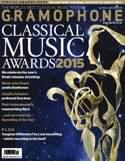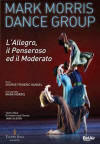Texte paru dans: / Appeared in: |
|
|
Outil de traduction (Très approximatif) |
|
|
Reviewer: David Vickers
The Mark Morris Dance Company’s production of Handel’s L’Allegro, il Penseroso ed il Moderato has toured all over the world since it was first staged at La Monnaie, Brussels, in 1988. A lavishly illustrated book about its sophisticated choreography was published in 2001, but this 2014 performance at the Teatro Real in Madrid is its long-overdue appearance on film. Morris’s glorious production reveals an insightful affection for Handel’s musical responses to Milton’s poems L’Allegro (‘Mirth’) and Il Penseroso (‘Melancholy’), but it is cavalier with the ode’s original structure, content and intellectual narrative: there are many cuts and reshuffles; numerous arias are allocated to incorrect voice types; and the inclusion of four extra high-quality arias Handel added in his 1741 revival inevitably hinders the pacing of the allegorical discourse. Handel’s third part, ‘Il Moderato’, is cut entirely, although two of its numbers are interpolated elsewhere (which means that the duet ‘As steals the morn’ is shorn of its true meaning of reconciliation and enlightenment for two quarrelling opponents). All this necessitates radical restructuring of the last scenes in order to make the adjusted two-part entertainment conclude plausibly. The original literary conception espousing the golden mean of moderation is discarded in favour of a reinterpreted vision in which every kind of intensely different emotion, attitude and personality has equal value. Morris’s reinterpretation is a consummately musical extravaganza that takes conspicuous inspiration from William Blake’s famous Miltonic illustrations, mingled with poses from classical sculpture and hints of Bernini (especially in a hunting scene for the bass’s song ‘Mirth admit me of thy crew’); on occasion there are charming allusions to formal Baroque dances in elegant dotted-rhythm footsteps, and the set-piece dances are often architecturally symmetrical and always strikingly beautiful, with nuanced uses of colours and varied backdrops (a pseudocathedral for ‘There let the pealing organ blow’). Jane Glover’s sage conducting enables the house orchestra to manage a reasonable approximation of Baroque style on modern instruments, and the resident chorus acquits itself adequately (albeit with some distinctly Spanish coloration of words and unbridled, over-operatic sopranos).
The quartet of solo singers, placed down in the orchestra pit, are hardly ever seen on camera. The mellifluous James Gilchrist and convivial Andrew Foster-Williams sing with their customary intelligence and stylishness. The relatively fruity and more than capable voices of Sarah-Jane Brandon and Elizabeth Watts are audibly too similar. I suspect Watts sings Penseroso’s music, but it might be a red herring to seek dramaturgical consistency. Even if the concept and performance are mixed delights, anyone fond of Handel’s masterpiece should see this.
|
|
|
|
|
|
Cliquez l'un ou l'autre
bouton pour découvrir bien d'autres critiques de CD |
|




